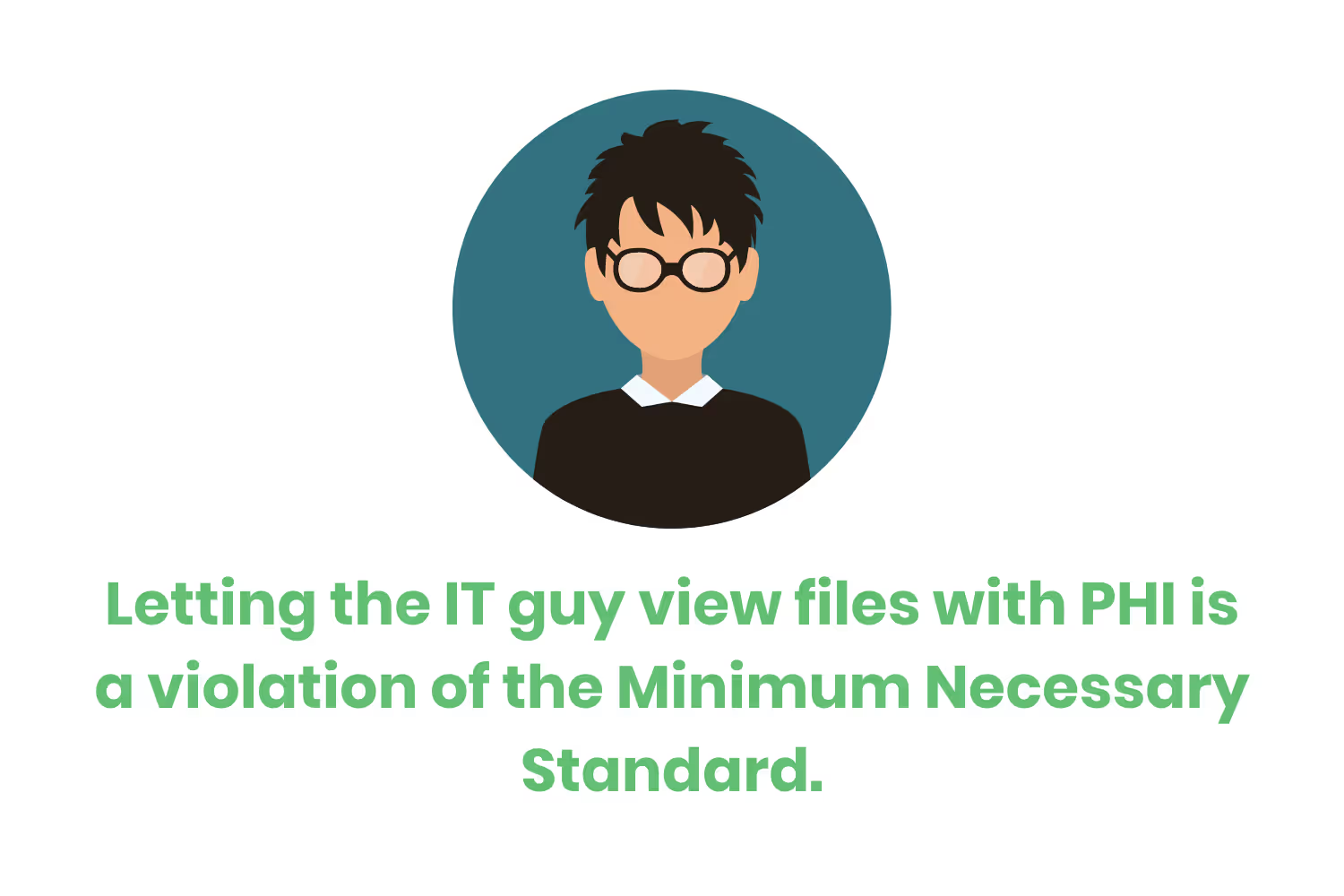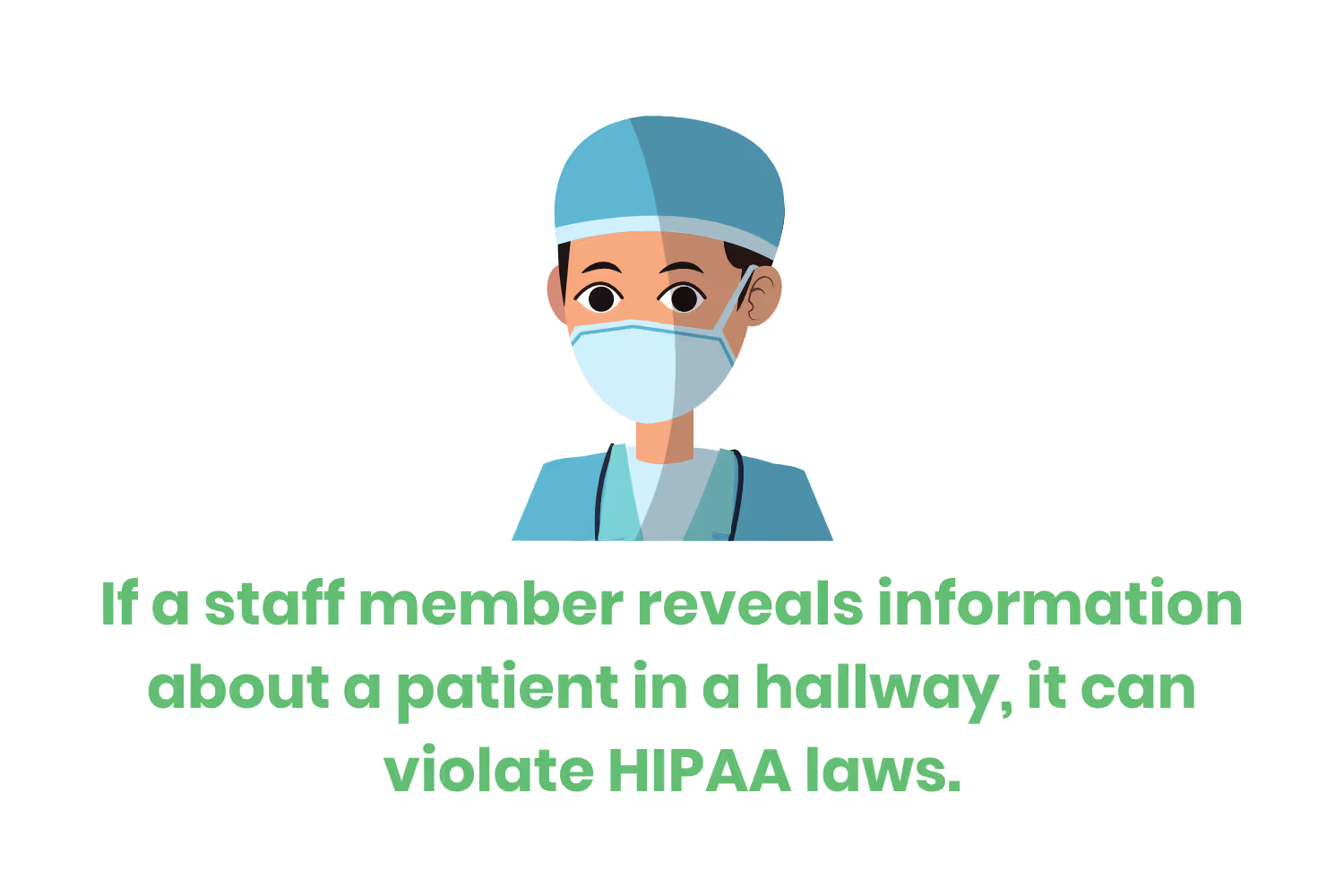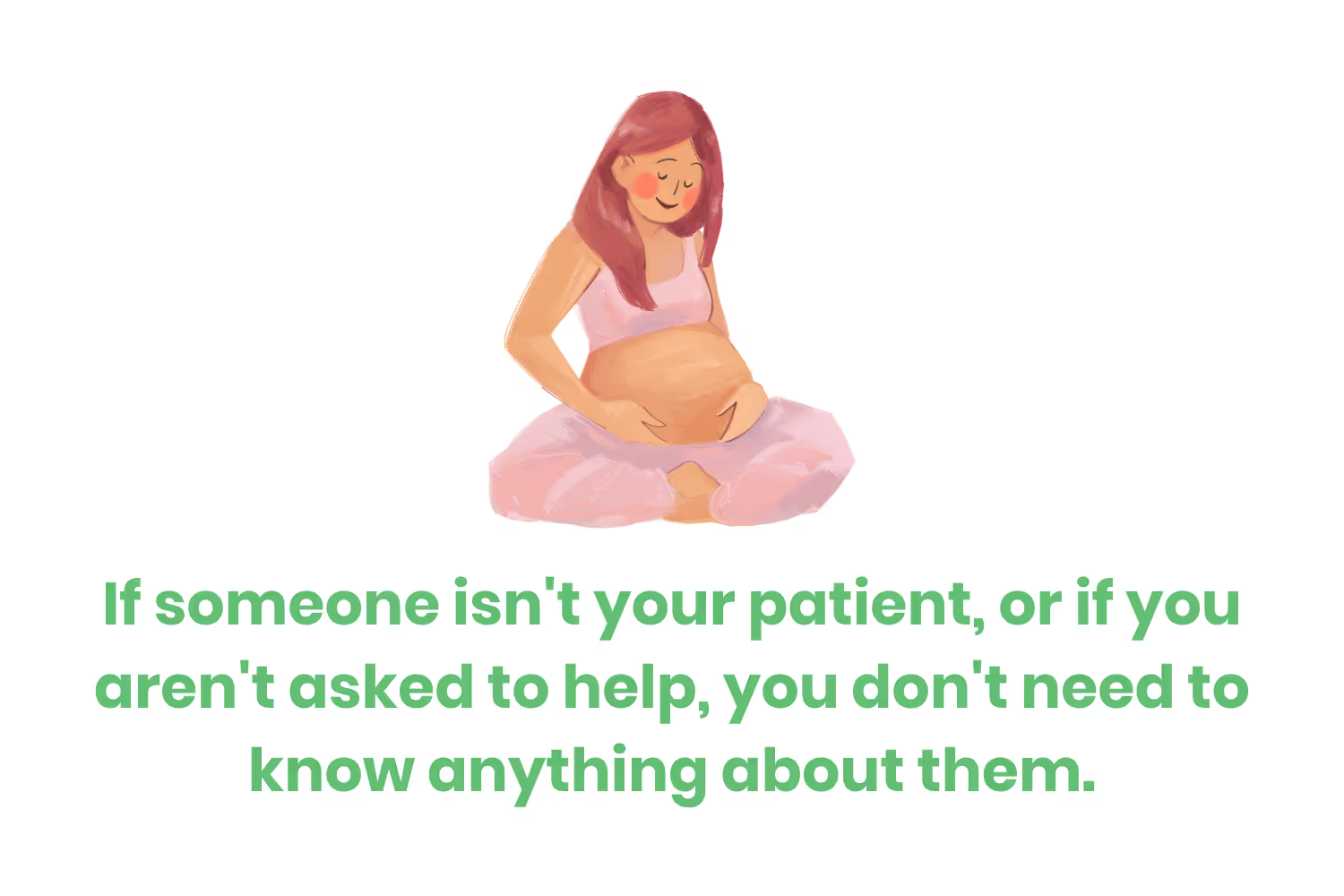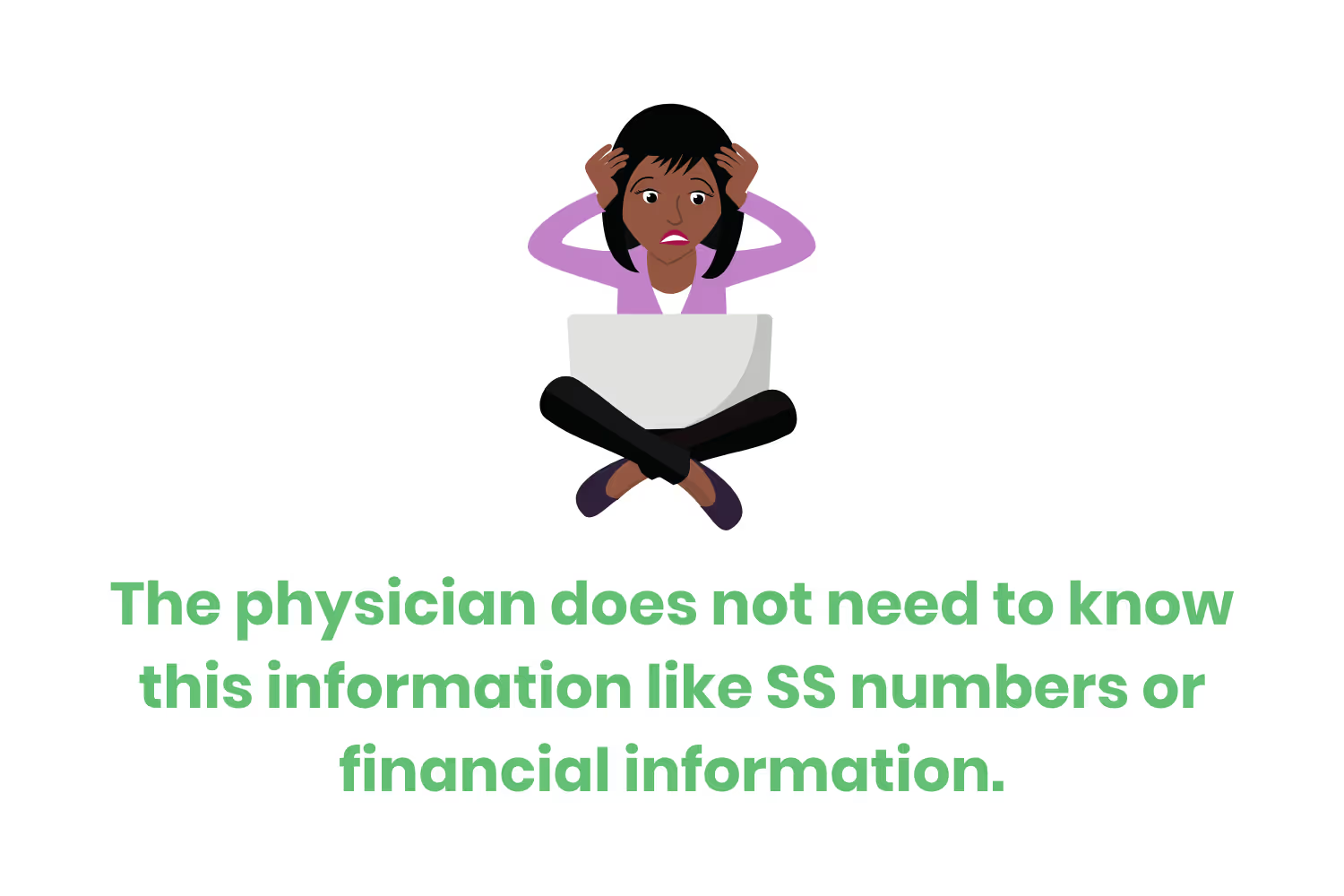5 HIPAA Mimimum Necessary Standard Scenarios and Examples
Here are 5 generalized examples of how the Minimum Necessary Standard applies to the treatment of a patient and hospital dynamics.

The Minimum Necessary Standard is a portion within the HIPAA Privacy Rule that refers to the sharing of protected health information (PHI). This portion of the law refers to only accessing or using PHI for appropriate business or medical purposes, to the least amount necessary.
If you’re a doctor and you share the information for any reason other than the treatment of the patient and for your job, the actions could be a violation of the HIPAA Privacy Rule.
Now, there are some situations where the Minimum Necessary Standard doesn’t apply. Doctors and staff can share PHI to provide treatments or to collaborate. If the patient authorizes a disclosure, then a doctor can share the information legally.
The Secretary of the HHS can also ask for disclosure of the information as detailed in 45 CFR Part 160 Subpart C. Some laws require the uses and disclosures of PHI and are necessary to comply with HIPAA rules.
So what kind of situations would violate the Minimum Necessary Standards? There are hundreds, if not thousands, of historical examples. Here are 5 generalized examples of how the Minimum Necessary Standard applies to the treatment of a patient and hospital dynamics.
Example 1: Family Intervention
No matter what type of doctor or nurse you might be, you aren’t allowed to access the protected health information of a family member. You aren’t allowed to access their records without their express permission.

But, what if this patient is your mother-in-law who is getting a tumor removed? What if the patient is your ex-husband’s wife who came in for a pregnancy checkup?
None of that matters. If the patient doesn’t explicitly say you have permission to know, you aren’t allowed to go into their digital records.
You also can’t pressure the healthcare professionals assigned to the patient to give you information. You aren’t allowed to eavesdrop on the conversation between the patient and staff on the case.
Example 2: IT Chaos
Your hospital might have regular cybersecurity checks to see if there was any unusual activity. The IT guy is likely monitoring your devices, checking to see if there is any spyware, keystroke logging, or other forms of malware.
Here’s another scenario that directly affects the Minimum Necessary Standard.
This particular day, the IT guy was checking a computer with stored protected health information. He clicks on a few files and looks at the patient records.
Now, he might be looking to see if the files can open. He might be looking at the algorithm of the file to see if anything looks suspicious.

However, the IT guy doesn’t require access to a patient's medical history to complete his job. If he accesses the medical information without the express permission of the patient, his actions are a violation of HIPAA.
Viewing the files and data wasn’t necessary for the IT guy to complete his job. Therefore, he violated the Minimum Necessary Standard.
Example 3: Backseat "Driving"
Have you ever had a manager or coworker that seems to always get in the way? Does this person tell you medical information about a patient that you already know?
Depending on the circumstances, this could be a violation of the Minimum Necessary Standard.
Pretend you’re a surgeon at a local hospital. Let’s say that a nurse performed a timeout before your patient went into surgery. The nurse goes into detail about what the procedure will entail, the risks, and the potential benefits. However, the nurse tells you to make sure you wear gloves because the patient has hepatitis C.
You already know to wear gloves. It’s surgery after all. The fact that the patient has hepatitis C is irrelevant in this situation since the gloves are mandatory for this procedure. On top of that, you already know the patient has hepatitis C. You received permission to view all the medical records to perform a successful surgery.

The nurse was being a backseat driver while telling you the information you already know.
How is this a violation of the Minimum Necessary Standard?
The nurse decided to share this information with you in the middle of the hallway where other doctors, staff, and patients could potentially hear the information. Having hepatitis C is very embarrassing to the patient.
Therefore, the patient files a complaint since people may know his health information without his permission. Plus, the hospital staff and other patients don’t need to know the information.
Example 4: Stardom
Pretend you and your best friend work for a gynecologist. One day, your friend tells you all about how the quarterback of your favorite football team came in with his girlfriend.
She confides in you that she is pregnant!
You follow the team on every social media outlet and know everything about each of the players, including their personal life. But you had no idea the quarterback was dating anybody let alone about to become a father.
You and your best friend gossip about the situation throughout the entire lunch break. How will it distract the quarterback this upcoming season?
When you get home you tell your significant other about the exciting news. You then grab your work laptop and play detective. First, you search all of the updated patient records from the last 48 hours. You look at all of the records that your friend had written. Next, you narrow it down to which of the patients you think is the quarterback’s girlfriend.

With these actions, you and your friend violated the Minimum Necessary Standard in several ways.
First, you didn’t need to know the information. The sharing of the information was not absolutely necessary for the treatment of the patient. Error one.
The second error was sharing the information with your spouse. They also didn’t need to know about the situation, the health information, and the details shared with you.
The third error was snooping. You weren't authorized to access the medical records. The patient didn’t give you express permission. Your knowledge of the situation does not benefit the patient or the treatment plan in any way, so you don’t have to know anything about the patient.
Example 5: Patient Database Errors
A physician assigned to a patient needs to know about all of the medical records, especially those related to the treatment at hand.
But what if there was a mixup? What if there was some private information mixed in the records that aren’t related to medical information?
This could happen in a few different ways.
Someone could have sent you the wrong file. The file could contain information like the patient’s social security number, billing address, and financial information. The physician doesn’t need to know this information. It’s completely unnecessary and the situation violated Minimum Necessary Standard.

Maybe someone scanned papers into the computer incorrectly and the person scanning didn’t pay attention to what the papers included or didn’t include a HIPAA compliant fax cover sheet.
So when the physician receives the email with the file, there is a lot of unnecessary information, violating the HIPAA Privacy Rule again.
Conclusion
The Minimum Necessary Standard is a complicated matter. Who absolutely needs to know the private health information? What type of information should you include and what information should you not include?
If the wrong information goes to the wrong person, it can lead to a HIPAA violation. This can mean a hefty fine at best and potential jail time at the worst.
Sharing information unnecessarily can happen in many ways. It can be through gossip, giving advice where people can overhear, sending the wrong paperwork to a doctor, accessing a file that you were not supposed to see, and snooping.
It doesn’t matter if the information is medical or financial. It doesn’t matter if the information is about a celebrity or a family member. The Minimum Necessary Standard applies to all individuals and protects all types of patients.
Emphasize your product's unique features or benefits to differentiate it from competitors
In nec dictum adipiscing pharetra enim etiam scelerisque dolor purus ipsum egestas cursus vulputate arcu egestas ut eu sed mollis consectetur mattis pharetra curabitur et maecenas in mattis fames consectetur ipsum quis risus mauris aliquam ornare nisl purus at ipsum nulla accumsan consectetur vestibulum suspendisse aliquam condimentum scelerisque lacinia pellentesque vestibulum condimentum turpis ligula pharetra dictum sapien facilisis sapien at sagittis et cursus congue.
- Pharetra curabitur et maecenas in mattis fames consectetur ipsum quis risus.
- Justo urna nisi auctor consequat consectetur dolor lectus blandit.
- Eget egestas volutpat lacinia vestibulum vitae mattis hendrerit.
- Ornare elit odio tellus orci bibendum dictum id sem congue enim amet diam.
Incorporate statistics or specific numbers to highlight the effectiveness or popularity of your offering
Convallis pellentesque ullamcorper sapien sed tristique fermentum proin amet quam tincidunt feugiat vitae neque quisque odio ut pellentesque ac mauris eget lectus. Pretium arcu turpis lacus sapien sit at eu sapien duis magna nunc nibh nam non ut nibh ultrices ultrices elementum egestas enim nisl sed cursus pellentesque sit dignissim enim euismod sit et convallis sed pelis viverra quam at nisl sit pharetra enim nisl nec vestibulum posuere in volutpat sed blandit neque risus.

Use time-sensitive language to encourage immediate action, such as "Limited Time Offer
Feugiat vitae neque quisque odio ut pellentesque ac mauris eget lectus. Pretium arcu turpis lacus sapien sit at eu sapien duis magna nunc nibh nam non ut nibh ultrices ultrices elementum egestas enim nisl sed cursus pellentesque sit dignissim enim euismod sit et convallis sed pelis viverra quam at nisl sit pharetra enim nisl nec vestibulum posuere in volutpat sed blandit neque risus.
- Pharetra curabitur et maecenas in mattis fames consectetur ipsum quis risus.
- Justo urna nisi auctor consequat consectetur dolor lectus blandit.
- Eget egestas volutpat lacinia vestibulum vitae mattis hendrerit.
- Ornare elit odio tellus orci bibendum dictum id sem congue enim amet diam.
Address customer pain points directly by showing how your product solves their problems
Feugiat vitae neque quisque odio ut pellentesque ac mauris eget lectus. Pretium arcu turpis lacus sapien sit at eu sapien duis magna nunc nibh nam non ut nibh ultrices ultrices elementum egestas enim nisl sed cursus pellentesque sit dignissim enim euismod sit et convallis sed pelis viverra quam at nisl sit pharetra enim nisl nec vestibulum posuere in volutpat sed blandit neque risus.
Vel etiam vel amet aenean eget in habitasse nunc duis tellus sem turpis risus aliquam ac volutpat tellus eu faucibus ullamcorper.
Tailor titles to your ideal customer segment using phrases like "Designed for Busy Professionals
Sed pretium id nibh id sit felis vitae volutpat volutpat adipiscing at sodales neque lectus mi phasellus commodo at elit suspendisse ornare faucibus lectus purus viverra in nec aliquet commodo et sed sed nisi tempor mi pellentesque arcu viverra pretium duis enim vulputate dignissim etiam ultrices vitae neque urna proin nibh diam turpis augue lacus.




